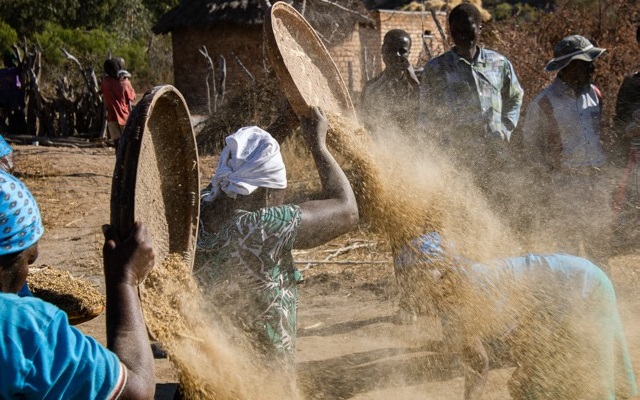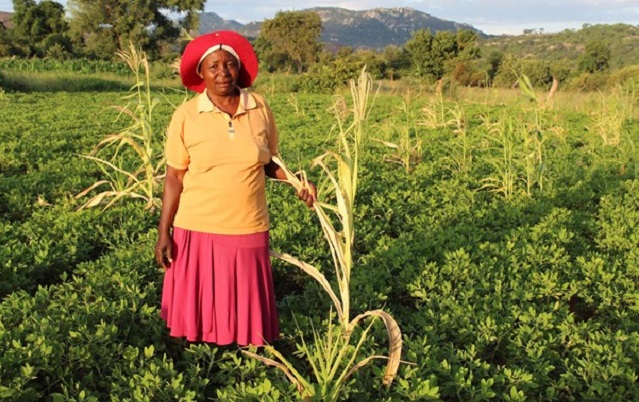Strengthening women seed custodians in community adaptation to the impacts of climate change

Weather extremes, soil erosion, seed loss, and biodiversity depletion increase the vulnerability of communities in Bikita district in the Masvingo Province. The goal of the IKI Small Grants project is to revive traditional seed and ecological governance systems by learning from elders who still carry traditional memory and knowledge leading to greater seed and food sovereignty as well as increased climate resilience. The project supports five communities to bring back ecological governance systems of ancestral lands and Sacred Natural Sites (SNS), the latter being areas of spiritual, cultural, and ecological significance. Community dialogues, agroecology trainings, a seed and food fair, learning exchanges between communities, and eco-mapping are targeting mainly women farmers, their families and communities, including elders,youth, spiritual leaders and SNS custodians.
INITIAL SITUATION
Bikita, 400 km south of Harare in Masvingo Province, is a rural farming area with relatively intact ecosystems and extensive high biodiversity that is rapidly degrading. Seed loss, soil erosion, biodiversity depletion, and weather extremes all increase the vulnerability of communities in Bikita. Underlying causes arise from an extractive, unsustainable land use approach.
Hybrid maize, an imported crop that has been the staple for decades, does not survive drought, which is becoming more prevalent due to climate change: The area is seeing extreme weather patterns, both droughts and floods.
The rivival of indigenous knowledge systems offers multiple opportunities: robust traditional seeds, age-old ecological farming practices and customary governance systems that managed ancestral lands, recognised high biodiversity areas and ecosystems incorporated in Sacred Natural Sites (SNS).
TARGET GROUP
The project targets mainly rural women farmers and their households in the District of Bikita where women outnumber men who leave for the cities or South Africa to earn an income. The work empowers women farmers who emerge as the leaders of most of the rural-based organisations or groups. The work engages the community as a whole but the focus is on knowledgeable elders and spiritual leaders who tend to be women, and on custodians of Sacred Natural Sites (SNS). The women spiritual mediuns provide guidance to male traditional leaders who participate and benefit from the work.
Governmental services such as for agricultural extension and health are also engaged and benefit from the project as well the Zimbabwe Smallholder Organic Farmers’ Forum (ZimSOFF).
VIDEOS FROM THE PROJECT
APPROACH AND ACTIVITIES
The objective of the project is to revive traditional seed and ecological governance systems in Bikita, leading to greater seed and food sovereignty, increased climate resilience and regenerated biodiverse ecosystems.
Five communities are engaged and accompanied to revive indigenous knowledge and practices to bring back traditional ecological governance systems of ancestral lands and Sacred Natural Sites (SNS), which are areas of spiritual, cultural and ecological significance, governed by traditional custodial systems.
The project implements agro-ecology trainings that promotes the diversification of local plant and seed varieties, the restoration of the soil and healing of the broader landscape. A seed and food fair offers the opportunity to learn about indigenous seed varieties and to share and exchange seeds, plants and knowledge. Learning exchanges, both on a farmer-to-farmer level and between communities are organised to support individual and collective learning. The communities develop ecological maps and calendars to document and transfer traditional knowledge and customary laws on seed diversity and sustainable food system that have been revived. Eco -mapping is yet another contribution for sustainable land use of the SN Sites.
LATEST PROJECT HIGHLIGHTS AND IMPACTS
- Project finalized.
- Weekly virtual team meetings bridged geographic distances between team members, board members, and farming communities.
- Knowledge sharing by visit of EarthLore’s director to the International Forum for Wellbeing in Grenoble, France
- Contributing to a Barefoot Guide publication, developed by the African Biodiversity Network
CAPACITY DEVELOPMENT
IKI Small Grants supports EarthLore in its organisational capacity development through:
- Series of short trainings on financial project management
- Practical training and facilitating reflections for deeper understanding and methodologies to revive indigenous knowledge and practice
ABOUT THE ORGANISATION
EarthLore is a non-governmental organisation based in the Republic of South Africa and operating both in South Africa and the Republic of Zimbabwe.
EarthLore partners with (rural) local communities to secure land, seed, food and water sovereignty. By reviving indigenous knowledge and protecting sacred natural sites (SNS) local self-governance is strengthened. Along with focused support and capacity building, this enables communities to become more resilient to climate change and to challenge the industrial processes which threaten livelihoods and endogenous development.
Working in partnership with like-minded organisations and individuals is a core part of EarthLore’s methodology.
PRESS AND MEDIA COVERAGE
GRAINS OF HOPE – Bikita, Zimbabwe from The Gaia Foundation on Vimeo.

